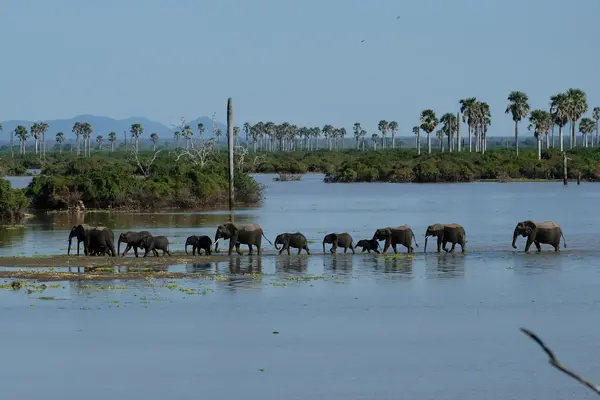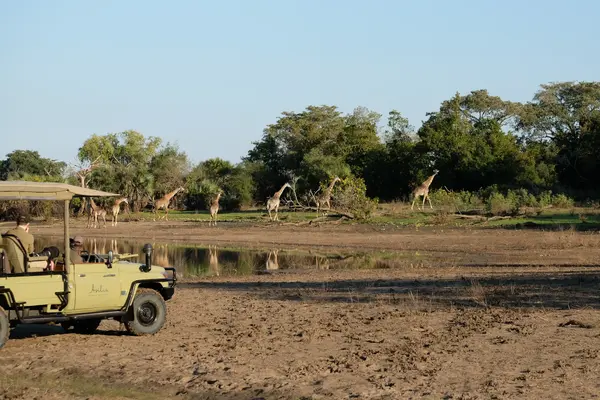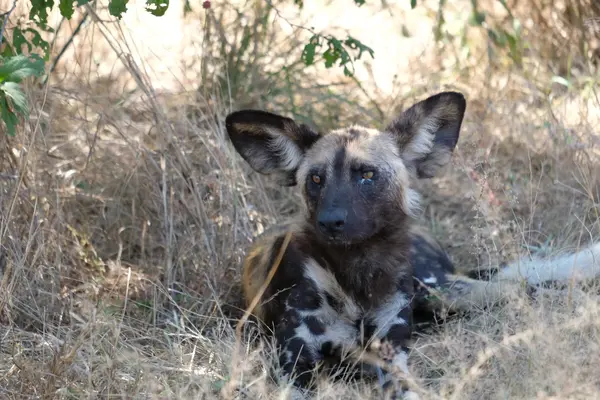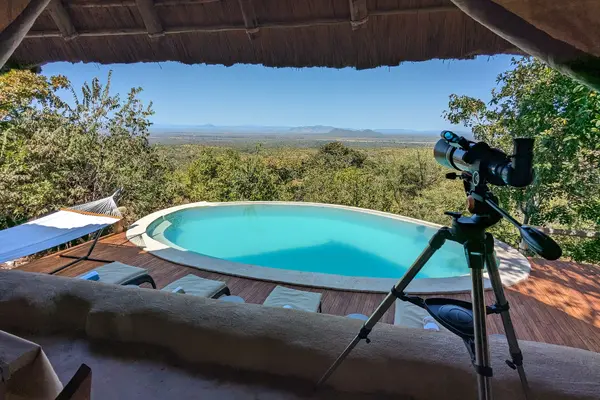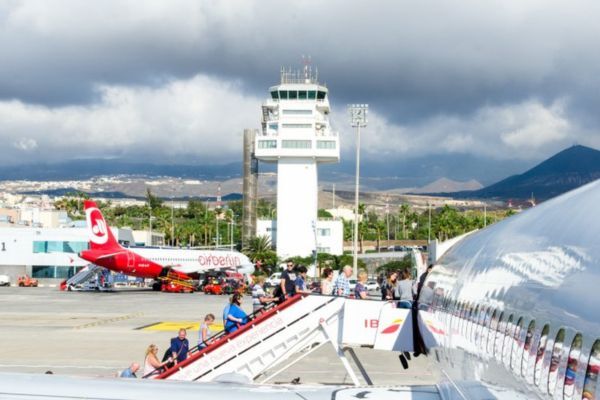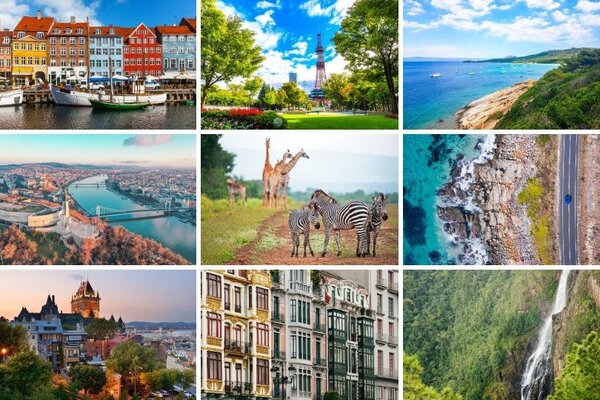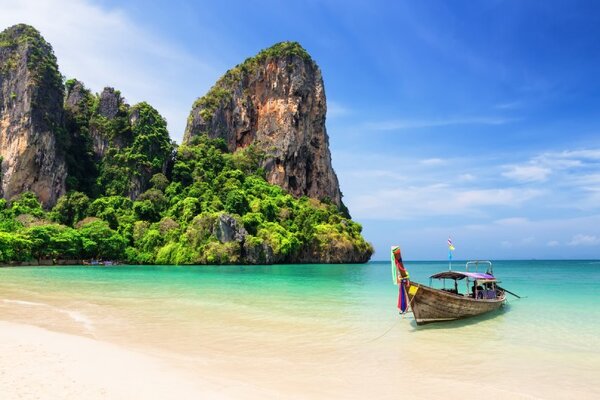The lesser-known area of Tanzania that will gift your clients their own private game drives
With the country’s northern safari circuit, including the famous Serengeti, packed to bursting, our writer joins an educational showcasing the quieter, wilder southern parks of Ruaha and Nyerere
Lenses framing faces we sit hushed, stately still, all eyes on the two gently jostling juvenile elephants at play in the river before us. Time slows as we capture their carefree capers, an enthusiastic water spurt or trumpet call here, an ear-flapping sidestep there, occasional water stomps warding off an inquisitive croc. Meanwhile, downriver, an impressive elephant crossing delivers further photography gold.
Had this been northern Tanzania, say the Serengeti, we’d share the scene with a sea of vehicles. Here in the under-visited south, touring Ruaha NP and Nyerere NP, our trade fam’s two vehicles have the sight to ourselves. This trend continues throughout the week, replete with unhurried, uninterrupted sightings of un-spooked game – ambrosia for safari aficionados.
While Tanzania’s north promises impressive big game concentrations, ‘The Great Migration’ and luxury lodges aplenty, Ruaha and Nyerere promise wild exclusivity, their handful of cosy camps, including Ruaha newcomer Asilia Kokoko, spread over a truly vast area. For our host Tim Henshall, Tanzania’s recently appointed UK Tourism Marketing Manager, this is “Africa as it used to be”.
“Ruaha is an amazing park that’s lived in the Serengeti’s shadow far too long, and merits so many more visitors,” asserts Henshall, adding, “Nyerere is its perfect partner, as it too offers so much to wildlife enthusiasts.”
First steps
With expectant faces glued to windows we approach Ruaha’s airstrip, startled giraffe and elephants the stand-in greeters before official guides Felix and Abraham spirit us to first base, Ruaha River Lodge. With its 17 recently upscaled ‘bandas’, Ruaha River Lodge impresses instantly. Guests typically stay three nights, we hear, milking its location aside the Great Ruaha River.
It’s gorgeous country, accented by portly baobab and candelabra cacti. Visiting plum at the start of the June-Feb safari season, water remains relatively abundant, and trees still shock emerald green against the parched scrub. While working harder for sightings, we savour those we get, concentrating focus on actors such as birds, the south being home to around half the country’s 1,000 species.
Rock hyrax relish the early morning rays as we next strike into the bush, our driver telling tale of hyenas circling the dining area the previous night. More tantalising titbits emerge over an inspection of Nomad Kigelia, an excellent seasonal camp with six tents, primed for walking safaris.
“We had 20 wild dogs on the camp this morning; you could hear them crunching on a kill,” confides manager Ken. “That’s what our guests started with at 6:45am today. It was like a migration of wild dogs!” Later we encounter some, chilling under an acacia, before – suddenly enervated, wildly sniffing the air – they skulk off, intent.
Magwusi
Flighty yellow-collared lovebirds guide our approach to Magwusi Safari Camp whose owner Chris Fox sees “massive potential” in his beloved Ruaha NP.
“You have a sense of space, a sense of Africa as it should be,” says Fox, adding, “It’s not selling itself on migrations, or animals around every corner.” Indeed, while home to a tenth of Africa’s lions, Fox cautions Ruaha’s big cats remain elusive in early June, still stalking prey on higher ground.
The camp’s trad, rustic feel is welcoming and charming, from the roomy main lodge to my platformed, thatch-covered tent, its front deck framing sweeping sightings along the dried-up riverbed.
En route to that evening’s scenic sundowners, guide Baldon stirs instant interest. “Maybe there’s a leopard over there. See the birds going up? Maybe he’s coming down to drink the water...” Alas, no spots, but the thrill lingers as we drink and snack, backtracked by the commotive bush as daytime’s players submit to the nightshift. Then returning to camp we encounter a spectacular sunset show, baobab silhouetted against fiery tangerine skies.
Among Ruaha’s fancier options, Ikuka’s strengths include its family tents and 1,400m elevation overlooking Ruaha Valley. “We even have a loo with a view!” notes co-manager Chevy, a separate ‘fly camp’, ‘the Rock House’, catering to lovebirds.
Over lunch, Chevy nails Ruaha’s appeal. “A busy day for us is six vehicles, and three of those will be ours! And people are continually charmed by the environment – the uniqueness of the flora; the baobabs; the sunsets...”.
More sweeping views await at tonight’s base, Hodi Hodi, set on a remote concession bordering Ruaha NP, featuring five rooms and two family rooms. While most arise to a spectacular sunrise balloon ride, others amongst us opt for one of guide Ivan’s walking safaris, expertly decoding the footprints and droppings of last night’s ‘bush telegraph’.
Nyerere nights
Shifting to the more watery world of Nyerere NP, a blanket of broccoli-like tree cover shot through with date palms preludes our landing at Selous Kulinda, a deliciously upscale riverside lodge. Cue our first guided boat safari along the mighty Rufiji, showboating kingfishers, bee-eaters and Goliath stork competing with yawning hippo and a croc emerging majestically from the water to swallow a fish, ensuring excited chatter over sandbar sundowners that morph into fireside nightcaps back at camp.
Next morning, en route to inspect sister camp Selous Impala Camp, also set beside the Rufiji, brings great bush sightings of insouciant seated giraffe. This before new driver-guide, Goodluck, spirits us to our next base, the slick and professional Asilia Roho Ya Selous, via a wildlife-rich waterhole, featuring our first wildebeest.
The Asilia’s wetland surrounds bring solid sightings. Plus, I awake to my best dawn chorus yet, the rhythmic chiming of frogs and birds interspersed with ‘huh-huh-huhs’ from wallowing hippos as an electric strawberry glow burst through the horizon.
“It’s like a private game drive here most of the time,” asserts Goodluck, ahead of our latest bush drive, and so it proves. Highlights include those elephant sightings I began with, while crossing the Rufiji to inspect Laba Laba, sister property of Ruaha’s Jongomero, we encounter a scrubby island outcrop awash with excitable spoonbills and sacred ibis as crocs look on hopefully.
Alas, tonight’s stay at Foxes’ Rufiji River Camp – sister camp to Ruaha River Lodge – signals my last taste of Nyerere’s watery wonderland. Mercifully, the camp’s riverside terrace rises to the occasion, conjuring one last explosive sunset – the gradiated riot of red and orange a fitting end to a joyously colourful trip.
Book it: African Pride has a nine-day safari in southern Tanzania from £7,839pp sharing, departing 31 May 2025, staying three nights apiece at Roho Ya Selous and Ikuka Camp. Price includes flights with Ethiopian from Heathrow via Addis Ababa; in-country flights from Dar – Selous – Ruaha – Dar; and a Ruaha balloon ride. Optional extensions include Zanzibar; african-pride.co.uk
Selling tips
“Ruaha and Nyerere must be Tanzania’s best kept secret. With great game and stunning scenery, they’re perfect for clients wanting a quieter safari experience.”
Liz Hall, managing director, African Pride
“Ruaha and Nyerere are undeniably standout destinations. Possessing a true sense of wilderness, they exude a presence of unexplored Africa with the chance of unique and intimate sightings at every corner.”
Jordan Fry, product manager, Wildlife Worldwide
“Nyerere offers huge variety in even half a day – the scenery arriving on a light aircraft, a dip in the lodge pool, a birdwatching and hippo boat trip, riverside sunset drinks…”
Helen Kennedy, Africa travel specialist, Rainbow Tours
